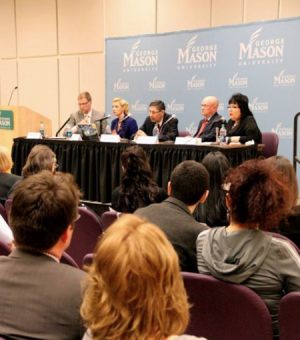Beyond Crimea: The Evolution of the Crisis in Ukraine
Beyond Crimea: The Evolution of the Crisis in Ukraine
 The Student Association and Advisory Board of the School for Conflict Analysis and Resolution (S-CAR) sponsored “Beyond Crimea: The Evolution of The Crisis in Ukraine” on April 23rd, 2014. Thanks to the tireless efforts of S-CAR students Sean Heravi (MS), Ellen Galadava (MS), Dilafruz Khonikboyeva (MS), David Younes (MS), and Alexandra Schaerrer-Cumming (PhD) and Advisory Board member Christine McCann, a distinguished panel of experts was organized to analyze the development, challenges, and opportunities for conflict resolution for the on-going crisis in Ukraine.
The Student Association and Advisory Board of the School for Conflict Analysis and Resolution (S-CAR) sponsored “Beyond Crimea: The Evolution of The Crisis in Ukraine” on April 23rd, 2014. Thanks to the tireless efforts of S-CAR students Sean Heravi (MS), Ellen Galadava (MS), Dilafruz Khonikboyeva (MS), David Younes (MS), and Alexandra Schaerrer-Cumming (PhD) and Advisory Board member Christine McCann, a distinguished panel of experts was organized to analyze the development, challenges, and opportunities for conflict resolution for the on-going crisis in Ukraine.
Dr. Michael Shank, PhD alumnus and S-CAR Adjunct Professor moderated an insightful discussion between Ambassador (Ret.) John Herbst, former U.S. Ambassador to Ukraine and current Director at the Center for Complex Operations; Dr. Karina Korostelina, Associate Professor at S-CAR; Colonel (Ret.) Lawrence Wilkerson, former Chief of Staff for Secretary of State Colin Powell; and Dr. Idil Izmirli, Crimea Analyst for the Jamestown Foundation and Adjunct Professor at S-CAR.
Ambassador Herbst opened the discussion submitting that the root of the crisis lay in domestic Ukrainian conflict factors yet escalated when Russian President Putin’s vision of Ukraine as either an internationally neutralized or a rump state was challenged by the outcome of the “Euromaiden” Revolution. He submitted that an unresolved challenge facing Ukraine will be whether it can reclaim territory annexed by Russia.
Dr. Korostelina credited the conflict factors to the enlargement of NATO, unresolved worldwide self-determination movements, no common civic Ukrainian identity, and salient primordial ethnic identities. She submitted that Ukraine represents three pillars of Russian identity: Russian Orthodoxy, the expansion of an empire, and victory in World War II. Considering the weight of identity on this conflict, she proposed a conflict resolution approach that promotes a shared Ukrainian society.
Reflecting on his current efforts to broker improved U.S. relations with Iran, COL Wilkerson challenged the community to develop empathy with the conflict parties to begin to understand an appropriate approach to conflict resolution.
Dr. Izmirli offered a lengthy list of early warning signs of the Crimean crisis simmering before the conflict escalated. She also outlined a list of human rights abuses in Crimea and the problems facing Crimean Tatars.
Dr. Shank invited everyone to consider the general disregard of international law and violations of state sovereignty and territorial integrity on the part of world powers when contrasted with the actions of Russia.
A spirited audience challenged the observations of the panelist and exhibited a pessimism regarding the appropriate conflict resolution approaches. Reflecting on the ominous hundredth anniversary of World War I, Professor Dennis Sandole asked the panel if we were sleepwalking into another world catastrophe as tensions escalate. The consequences, the panel members concluded, would be a tremendous cost that the Atlantic community is not prepared to pay. Despite debates over hard or soft power approaches, outlook on institution building, and the construction of a shared Ukrainian civic identity, the audience was encouraged by Dr. Izmirli’s observation of Crimean Tatars sharing their mosques for Ukrainian Orthodox services currently excluded by the pro-Russian authorities in Crimea.
The evening concluded with a reception during which incisive reflections were shared over light refreshments and wine graciously furnished by Kerry McKenney of the S-CAR Advisory Board.




